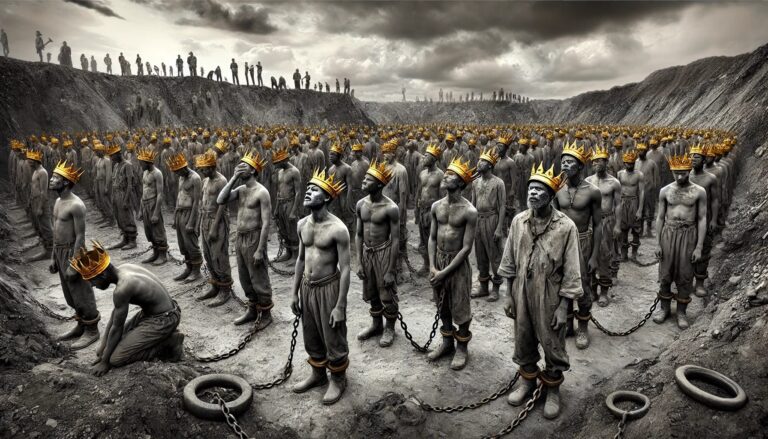Regarding the nomination of Russell Vought to head the Office of Management and Budget, President-elect Donald Trump wrote the following (“Donald Trump chooses Scott Bessent as Treasury Secretary”, Financial Times, 2024) November 23).
Russ knows exactly how to dismantle the deep state and end weaponized government, and he will help us restore self-government to our people.
What rational understanding can we make of the idea of people’s autonomy? First, let us note that the word “governance” is often used to cleanse the coercive elements of “government” . The former concept clearly emphasizes abstract processes rather than governors and their victims. However, let’s ignore this fun and treat “autonomy” and traditional “autonomy” as synonyms. The expression “people’s autonomy (or autonomy)” has four meanings.
First, the intuitive meaning is that “the people” govern themselves. Or is it “myself” or “herself”? This question does not make sense unless “people” are a kind of social organism or anthropomorphic being that can think and do things, and individuals are just cells. It suggests that it has no meaning. This concept of society has inspired or justified totalitarianism in various eras of humanity. For a development of this approach, see my ‘The Impossibility of Populism’, The Independent Review, Summer 2001.
Incidentally, the underlying definition of populism that I use and that I pursue is not far from the accepted definition in economics and political science. See Cass Mudde and Cristóbal Rovira Kaltwasser, Populism: A Very Short Introduction (Oxford University Press, 2017). Or consider “Populist Leaders and the Economy” by Manuel Funke et al. (American Economic Review 113-12). [2023]), in explaining the definitions used for econometric databases, write:
More precisely, populists usually portray “the people” as a suffering, inherently good, virtuous, and genuine ordinary common majority whose collective will is embodied in populist leaders. has been done.
Scholars who study populism emphasize that historically and theoretically there are right-wing and left-wing regimes.
A second non-Frankensteinian meaning of popular autonomy regards popular autonomy as majority government by the members of the people. What does this mean other than that the majority somehow governs itself, or more specifically, a minority that is itself ruled by others?Philosophy It is worth recalling the fable by the late Robert Nozick of the United States (see his 1974 book Anarchy, State, and Utopia, pp. 290-292). You are one of the 10,001 slaves of a cruel master. At some point, your master will become more kind to his slaves (including you), stop beating them, and start taking into account their needs, merits, and other similar factors when assigning their tasks. It will be. Later, their working week was reduced to three days. He later even allowed them to go and work in the open market on the condition that he gave them three-sevenths of their wages. He still retains the power to call them back to the plantation in emergencies and restrict their right to engage in certain personal activities (such as climbing or smoking) that could reduce production capacity. But if you continue the process of liberalization, your master will ask the other 10,000 slaves, other than you, to discuss among themselves what percentage of their income they will receive, including you. This will allow them to vote on all decisions previously made, such as whether the Investing in a common fund and how that money is used. One day, if 10,000 people vote in a 5,000-5,000 tie, you will favorably decide that you can vote yourself (which will never happen). Finally, 10,000 people decide to allow their ballots to be thrown together before they are counted. All 10,001 people, including you, democratically make all the decisions you want about everyone’s lives. Nozick’s question: Where in that sequence did you stop being a slave?
The third meaning of autonomy is that each individual (understood in the plural sense of individuals) making up the people governs himself. This worthy ideal was recognized as at least partially realizable with the discovery of spontaneous social order in the 18th century. The literal autonomy of the individual represents the ideal of classical liberalism, and its subsequent extension into various theories of individualist anarchism (such as Murray Rothbard, David Friedman, and Anthony de Jasay) represents. These two broad liberal currents are perhaps best represented today by James Buchanan and the constitutional political economy school, respectively, which recognize the ultimate veto over each individual in political society. On the other side is the liberal anarchism of Anthony de Jasay, which advocates complete freedom for each individual over contracts and property.
Let me explain with a simple but exemplary example of liberal autonomy. It is the freedom for individuals or their suppliers or intermediaries to import dolls, for example from Chinese producers, if the importer and exporter involved reach a mutually beneficial agreement. The fact that foreign parties to such agreements do not benefit from their own autonomy is unfortunate, but does not change the definition of autonomy for parties living in free countries. It is highly unlikely that Mr. Trump supports the third meaning of popular self-governance.
The only possibilities left for the meaning of this expression are some kind of religious spell, or an AI hallucination created by the frequent juxtaposition of the words in the zeitgeist.
*******************************************
self-governing citizen king


